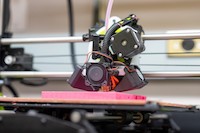medical community
See the following -
Fax Is Not a Machine, It Is a Technology
 Once more I am listening to a presentation on interoperability. These always get a little uncomfortable - especially in the early going - because I can almost predict where the presenter will go horribly wrong and do a complete disservice to the audience (generally somewhere between slides 3 and 8). This time it was slide 6 where the speaker inserts stock picture of a decrepit old fax machine with paper cascading off a desk and onto the floor. This comes along with the typical lecture on everything that is wrong with "fax". With the lemmings in the audience nodding/snickering along, the speaker proceeds to misinform and mislead the group. Cringe-worthy really. What's misleading? Pretty much everything he says.
Once more I am listening to a presentation on interoperability. These always get a little uncomfortable - especially in the early going - because I can almost predict where the presenter will go horribly wrong and do a complete disservice to the audience (generally somewhere between slides 3 and 8). This time it was slide 6 where the speaker inserts stock picture of a decrepit old fax machine with paper cascading off a desk and onto the floor. This comes along with the typical lecture on everything that is wrong with "fax". With the lemmings in the audience nodding/snickering along, the speaker proceeds to misinform and mislead the group. Cringe-worthy really. What's misleading? Pretty much everything he says.
- Login to post comments
Health Hack 2014-The Power of Open Source, Open Data, and Cross-Disciplinary Collaboration
ThoughtWorks, an agile developement and design company, hosted and sponsored (among other sponsors, like Red Hat) the second annual Health Hack in Melbourne, bringing researchers together with technologists at their office in Melbourne’s central business district for 48 hours to create software that solved a problem in the health sciences. All the code developed at Health Hack would be released under an open source license, and in most cases, took advantage of some form of open data...
- Login to post comments
Health IT Interoperability Reimagined!
 The evolution of fax from paper-based to cloud transmission and storage (CloudFax) is a key step that enables CloudFax providers to comply with HIPAA and other regulations. Further strengthening of CloudFax as a key component in Healthcare Information Systems (HIS) will be its evolution into a Direct Messaging platform that enables the seamless exchange of Patient Health Information (PHI) between the diverse data and document management systems used by labs, pharmacies, doctor's offices, hospitals, and billing providers. CloudFax will support and contribute to the goals of interoperability. Consider:
The evolution of fax from paper-based to cloud transmission and storage (CloudFax) is a key step that enables CloudFax providers to comply with HIPAA and other regulations. Further strengthening of CloudFax as a key component in Healthcare Information Systems (HIS) will be its evolution into a Direct Messaging platform that enables the seamless exchange of Patient Health Information (PHI) between the diverse data and document management systems used by labs, pharmacies, doctor's offices, hospitals, and billing providers. CloudFax will support and contribute to the goals of interoperability. Consider:
- Login to post comments
How to Contribute to Open Source Healthcare Projects for COVID-19
 Many of those that are familiar with the maker movement, including me, believe there is a significant opportunity to apply open source design principles and mass-scale collaborative distributed manufacturing technologies (like open source 3D printing) to at least partially overcome medical supply shortages during the COVID-19 pandemic...Many people agree there is enormous potential with the approach despite the challenges and have started to self-organize to develop open source hardware to fight COVID-19. The largest group is Project Open Air. They are a group of "Helpful Engineers" who have congregated to aid in the COVID-19 pandemic response by developing both open source hardware and open source software. The Helpful Engineers are working on medical devices such as open source ventilators, to create a solution that can be quickly reproduced and assembled locally worldwide. Read More »
Many of those that are familiar with the maker movement, including me, believe there is a significant opportunity to apply open source design principles and mass-scale collaborative distributed manufacturing technologies (like open source 3D printing) to at least partially overcome medical supply shortages during the COVID-19 pandemic...Many people agree there is enormous potential with the approach despite the challenges and have started to self-organize to develop open source hardware to fight COVID-19. The largest group is Project Open Air. They are a group of "Helpful Engineers" who have congregated to aid in the COVID-19 pandemic response by developing both open source hardware and open source software. The Helpful Engineers are working on medical devices such as open source ventilators, to create a solution that can be quickly reproduced and assembled locally worldwide. Read More »
- Login to post comments
Michigan Tech Engineering Team Joins Open Source Ventilator Movement
 As COVID-19 continues to spread, the research community is looking for solutions. In addition to work on vaccines and medicine, medical technology is needed. In severe cases of COVID-19, the disease attacks the respiratory system, and one of the major bottlenecks in treatment is having enough ventilators. The open-source hardware community wants to change that. Joshua Pearce...an open-source hardware expert and co-editor-in-chief of HardwareX [explained] that 3D-printed lab hardware and other open-source tech can be cost-effective and encourages design improvement. "Even complex medical devices are not outside the realm of possibility anymore."
As COVID-19 continues to spread, the research community is looking for solutions. In addition to work on vaccines and medicine, medical technology is needed. In severe cases of COVID-19, the disease attacks the respiratory system, and one of the major bottlenecks in treatment is having enough ventilators. The open-source hardware community wants to change that. Joshua Pearce...an open-source hardware expert and co-editor-in-chief of HardwareX [explained] that 3D-printed lab hardware and other open-source tech can be cost-effective and encourages design improvement. "Even complex medical devices are not outside the realm of possibility anymore."
- Login to post comments